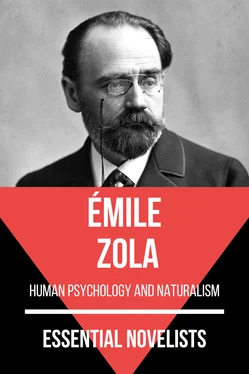Yet a caretaker lived there, old Mouque, to whom the Company had given up, almost beneath the destroyed tower, two rooms which were constantly threatened by destruction from the expected fall of the last walls. He had even been obliged to shore up a part of the roof, and he lived there very comfortably with his family, he and Mouquet in one room, Mouquette in the other. As the windows no longer possessed a single pane, he had decided to close them by nailing up boards; one could not see well, but it was warm. For the rest, this caretaker cared for nothing: he went to look after his horses at the Voreux, and never troubled himself about the ruins of Réquillart, of which the shaft only was preserved, in order to serve as a chimney for a fire which ventilated the neighbouring pit.
It was thus that Father Mouque was ending his old age in the midst of love. Ever since she was ten Mouquette had been lying about in all the corners of the ruins, not as a timid and still green little urchin like Lydie, but as a girl who was already big, and a mate for bearded lads. The father had nothing to say, for she was considerate, and never introduced a lover into the house. Then he was used to this sort of accident. When he went to the Voreux, when he came back, whenever he came out of his hole, he could scarcely put a foot down without treading on a couple in the grass; and it was worse if he wanted to gather wood to heat his soup or look for burdocks for his rabbit at the other end of the enclosure. Then he saw one by one the voluptuous noses of all the girls of Montsou rising up around him, while he had to be careful not to knock against the limbs stretched out level with the paths. Besides, these meetings had gradually ceased to disturb either him who was simply taking care not to stumble, or the girls whom he allowed to finish their affairs, going away with discreet little steps like a worthy man who was at peace with the ways of nature. Only just as they now knew him he at last also knew them, as one knows the rascally magpies who become corrupted in the pear-trees in the garden. Ah! youth! youth! how it goes on, how wild it is! Sometimes he wagged his chin with silent regret, turning away from the noisy wantons who were breathing too loudly in the darkness. Only one thing put him out of temper: two lovers had acquired the bad habit of embracing outside his wall. It was not that it prevented him from sleeping, but they leaned against the wall so heavily that at last they damaged it.
Every evening old Mouque received a visit from his friend, Father Bonnemort, who regularly before dinner took the same walk. The two old men spoke little, scarcely exchanging ten words during the half-hour that they spent together. But it cheered them thus to think over the days of old, to chew their recollections over again without need to talk of them. At Réquillart they sat on a beam side by side, saying a word and then sinking into their dreams, with faces bent towards the earth. No doubt they were becoming young again. Around them lovers were turning over their sweethearts; there was a murmur of kisses and laughter; the warm odour of the girls arose in the freshness of the trodden grass. It was now forty-three years since Father Bonnemort had taken his wife behind the pit; she was a putter, so slight that he had placed her on a tram to embrace her at ease. Ah! those were fine days. And the two old men, shaking their heads, at last left each other, often without saying good night.
That evening, however, as Étienne arrived, Father Bonnemort, who was getting up from the beam to return to the settlement, said to Mouque:
"Good night, old man. I say, you knew Roussie?"
Mouque was silent for a moment, rocked his shoulders; then, returning to the house:
"Good night, good night, old man."
Étienne came and sat on the beam, in his turn. His sadness was increasing, though he could not tell why. The old man, whose disappearing back he watched, recalled his arrival in the morning, and the flood of words which the piercing wind had dragged from his silence. What wretchedness! And all these girls, worn out with fatigue, who were still stupid enough in the evening to fabricate little ones, to yield flesh for labour and suffering! It would never come to an end if they were always filling themselves with starvelings. Would it not be better if they were to shut up their bellies, and press their thighs together, as at the approach of misfortune? Perhaps these gloomy ideas only stirred confusedly in him because he was alone, while all the others at this hour were going about taking their pleasure in couples. The mild weather stifled him a little, occasional drops of rain fell on his feverish hands. Yes, they all came to it; it was something stronger than reason.
Just then, as Étienne remained seated motionless in the shadow, a couple who came down from Montsou rustled against him without seeing him as they entered the uneven Réquillart ground. The girl, certainly a virgin, was struggling and resisting with low whispered supplications, while the lad in silence was pushing her towards the darkness of a corner of the shed, still upright, under which there were piles of old mouldy rope. It was Catherine and big Chaval. But Étienne had not recognized them in passing, and his eyes followed them; he was watching for the end of the story, touched by a sensuality which changed the course of his thoughts. Why should he interfere? When girls refuse it is because they like first to be forced.
On leaving the settlement of the Deux-Cent-Quarante Catherine had gone to Montsou along the road. From the age of ten, since she had earned her living at the pit, she went about the country alone in the complete liberty of the colliers' families; and if no man had possessed her at fifteen it was owing to the tardy awakening of her puberty, the crisis of which had not yet arrived. When she was in front of the Company's Yards she crossed the road and entered a laundress's where she was certain to find Mouquette; for the latter stayed there from morning till night, among women who treated each other with coffee all round. But she was disappointed; Mouquette had just then been regaling them in her turn so thoroughly that she was not able to lend the half-franc she had promised. To console her they vainly offered a glass of hot coffee. She was not even willing that her companion should borrow from another woman. An idea of economy had come to her, a sort of superstitious fear, the certainty that that ribbon would bring her bad luck if she were to buy it now.
She hastened to regain the road to the settlement, and had reached the last houses of Montsou when a man at the door of the Piquette Estaminet called her:
"Eh! Catherine! where are you off to so quick?"
It was lanky Chaval. She was vexed, not because he displeased her, but because she was not inclined to joke.
"Come in and have a drink. A little glass of sweet, won't you?"
She refused politely; the night was coming on, they were expecting her at home. He had advanced, and was entreating her in a low voice in the middle of the road. It had been his idea for a long time to persuade her to come up to the room which he occupied on the first story of the Estaminet Piquette, a fine room for a household, with a large bed. Did he frighten her, that she always refused? She laughed good-naturedly, and said that she would come up some day when children didn't grow. Then, one thing leading to another, she told him, without knowing how, about the blue ribbon which she had not been able to buy.
"But I'll pay for it," he exclaimed.
She blushed, feeling that it would be best to refuse again, but possessed by a strong desire to have the ribbon. The idea of a loan came back to her, and at last she accepted on condition that she should return to him what he spent on her. They began to joke again: it was agreed that if she did not sleep with him she should return him the money. But there was another difficulty when he talked of going to Maigrat's.
Читать дальше












